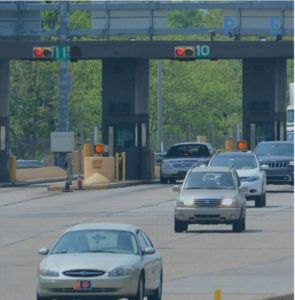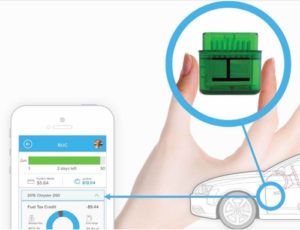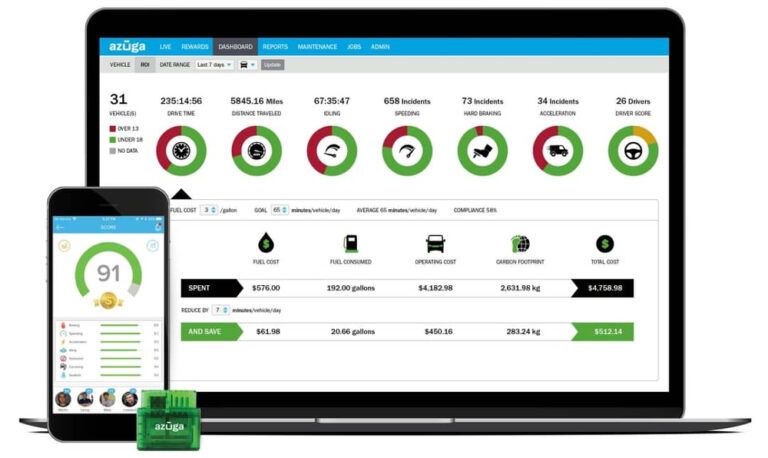One of the leading global providers of connected vehicle and fleet telematics technologies Azuga has been selected by the I-95 Corridor Coalition as the exclusive technology provider for the second phase of its multi-state mileage-based user fee (MBUF) pilot program.
Led by the I-95 Corridor Coalition and other regional stakeholders, Phase 2 of the pilot is designed to further explore the feasibility of replacing the current fuel tax system with mileage-based road user charging (RUC) along the USA’s major east coast corridor. The Departments of Transportation (DOTs) in Pennsylvania and Delaware, along with other states in the region, expect to have up to 1,000 volunteers participate in Phase 2 of the pilot, which will also examine the viability of making use of the MBUF system to handle tolls along the I-95 Corridor.
Driven by improved vehicle fuel efficiency, fuel tax revenues are expected to continually decline, which is prompting many states to explore alternative financial sources to fund road repairs and improvements. This multi-state pilot is an opportunity to continue to observe unique challenges such as cross-state line travel and toll interoperability, as each state would have differing MBUF rates and revenue streams. Using mileage data collected by Azuga’s telematics technology, the Coalition aims to gain a better understanding of how a per-mile fee could work throughout a region where drivers may drive through two or even three states a day.
 Azuga’s easy-to-use connected car technology accurately captures miles driven as well as proximity to toll stations for fair monthly assessments. Using a combination of location and geofencing technology, Azuga’s services also offer auto-calculation functions such as subtracting fuel taxes paid at the pump and/or tallying toll charges. Then, on the state’s behalf, Azuga automatically invoices for the net MBUF. For select participants, Azuga auto-invoices for total tolls, although, no actual funds will be transferred as part of the pilot. As an added benefit, the company’s end-to-end MBUF solution also provides value-added services to keep drivers engaged, such as engine health, battery voltage and driving behavior insights.
Azuga’s easy-to-use connected car technology accurately captures miles driven as well as proximity to toll stations for fair monthly assessments. Using a combination of location and geofencing technology, Azuga’s services also offer auto-calculation functions such as subtracting fuel taxes paid at the pump and/or tallying toll charges. Then, on the state’s behalf, Azuga automatically invoices for the net MBUF. For select participants, Azuga auto-invoices for total tolls, although, no actual funds will be transferred as part of the pilot. As an added benefit, the company’s end-to-end MBUF solution also provides value-added services to keep drivers engaged, such as engine health, battery voltage and driving behavior insights.
Results from the first phase of the I-95 Coalition’s 2018 mileage-based user fee pilot study, completed with 155 participants across 13 east coast states, showed that MBUF technology is feasible for collecting tolls. Phase 1 of the study also revealed that participation in the pilot markedly reduced common concerns around privacy and security, dropping the percentage of concerned participants from 57% at the beginning of the pilot to just 30% after the pilot. Approximately 90% of participants would be willing to partake in another pilot. As phases are completed, researchers will gather and evaluate participant feedback and vehicle data to better understand the challenges and opportunities presented by a per-mile user fee in a multi-state region.
“More than 20% of miles driven during the Coalition’s initial pilot occurred outside the drivers’ home states, confirming that figuring out how to handle out-of-state mileage is critical to understanding if MBUF could be a potential transportation funding option for the country,” said Dr Patricia Hendren, executive director of the I-95 Corridor Coalition. “We are excited to continue our working relationship with Azuga during our second and expanded MBUF pilot that will further test the boundaries of MBUF technology, including the integration with toll facilities and value-added amenities such as visual trip logs.”





